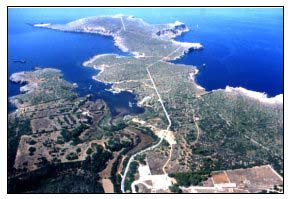RESEARCH >1. The toponimical Sanisera
 The toponimical Sanisera The toponimical Sanisera
The toponimical study of the name Sanisera by J. S. Hernández1, has reinforced the uncertainty of its etymological origin. No other analogous form has been found in Mediterranean place names, Roman or pre-Roman. By its morphological composition, it is considered that probably it is far from being a name of Latin origin.
The name Sanisera could be made up of two elements: SANI + SERA. In principle, we think these elements are foreign to the Latin language, and they should be of indigenous pre-Roman origin. If Sani is the root element, although still very obscure, it could be related to the Iberian sani- as found in several epigraphical records2. This makes us think that the element could be an Iberian anthroponimical. For this reason, we think that the element, common in Iberian anthroponims, should be taken into consideration when explaining the first part of the place name Sanisera.
Regarding -sera, the result of our research is much more difficult and obscure. Far from being a Latin element, we have not found a single analogous term in pre-Roman languages. We have only found a hypothetical explanation, as in the Indoeuropean there exists the root *ser-/*sor-, meaning “to flow, to run”, in reference to water that moves fast and with intensity3.
In this interpretation, we should not forget the geographical location of the Sanisera site, a natural harbour in the centre-north part of the island. This Indoeuropean root could appear in the second element of our place-name, as a geographical maritime reference to either a natural source of water or the stream of fresh water that flows into the port.
Nevertheless, we want to make clear the hypothetical nature of our explanation, as we do not have enough linguistic base to confirm our statements.
(1) Hernández, J.S.; Análisi del topònim de Sanisera, en Sa Nitja, La ciutat romana de Sanisera: Memòria de Recerca, pp. 1003-1008.
(2) s.a.n.i. (Siles 1288) Tivissa. Pàtera. 2) s.a.n.e.r. (Siles 1372): El Solaig. Plom. 3) sani (---) (Velaza 457): Pech Maho. Plom. 4) sanibar (Velaza 458): Pech Maho. Plom. 5) sanibeirai (Velaza 459): Orley. Plom. 6) sanikeai (Velaza 460): Orley. Plom. 7) sanibelser (CIL I2 709).
(3) Pokorny, J. Indogermanisches etymologisches Wörterbuch, Bern, pp. 909-910.
|



